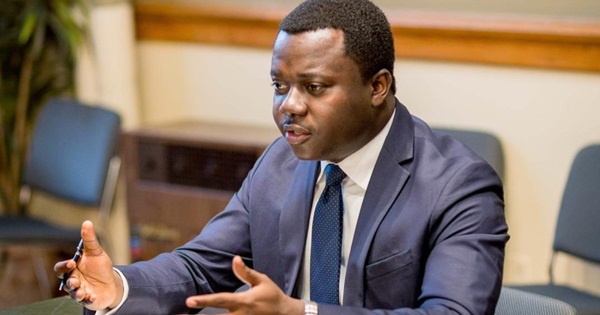In the ongoing debate about parliamentary privilege and political accountability, Dr. Maliha Abubakar, a political scientist, has urged a return to common sense and constitutional integrity.
Her critique of Hon. John Ntim Fordjour’s recent actions over alleged drug trafficking accusations strikes at the heart of the role of parliamentarians in a democratic state—and the consequences of abusing the protections granted to them.
According to Dr. Abubakar, the privilege of free expression granted to Members of Parliament should not be abused or misinterpreted.
She clarified that “under the guise of parliamentary privilege, you have the right to freedom of expression whilst performing your role or duty as a parliamentarian,” but stressed this cannot extend to unsanctioned public platforms.
“If you go and sit on a radio station… and then you go on your own volition to make serious allegations, then you should be ready to provide information and not hide under the guise of parliamentary immunity.”
Dr. Maliha Abubakar
Despite the Speaker of Parliament’s clarification that the parliamentary privilege Fordjour seeks to invoke applies only within parliamentary settings, the MP has not honored an invitation to provide evidence supporting his claims.

In an interview with the Vaultz News, Dr. Abubakar asserted that the issue ought to be addressed through lawful and respectful channels.
She stressed the importance of following established legal procedures, noting that Ghana operates under civilian governance with institutional frameworks designed to uphold due process and justice for everyone involved.
Her remarks come in response to Rev. John Ntim Fordjour’s refusal to cooperate with security agencies after publicly alleging drug-related misconduct—an issue that has since dominated media and public discourse.
Parliamentary Privilege And Its Limits
Dr. Abubakar further argued that Rev. Fordjour’s cooperation is essential not only for maintaining his credibility but also for preserving the reputation of the institution he represents.
“It is in his own interest to protect his reputation [and] to actually appear before the committee and provide the needed information… failure to do that only smacks of the falsehood that he spread.”
Dr. Maliha Abubakar

Dr. Abubakar was also clear on what parliamentary oversight entails, stating that “whatever he did had nothing to do with parliamentary oversight. He did that as a private individual.”
According to her, without an official committee mandate or an official platform, Hon. Fordjour’s statements fall outside the scope of protected parliamentary functions.
On the political implications of Fordjour’s behavior, Dr. Abubakar did not mince words. She suggested that if he fails to appear, “it would also sort of solidify the claims of others that the NPP is desperately struggling for relevance.”
In her view, invoking parliamentary privilege in this context appears more like political theater than a sincere effort to uphold justice.
She also cited the example of Hon. Samuel Okudzeto Ablakwa, a legislator known for exposing corruption and misconduct.
According to her, “he was always ready to support with evidence… and he attended invitations extended to him by security agencies.”
This readiness to cooperate stands in stark contrast to Fordjour’s perceived evasiveness.
NPP Urged To Intervene In Fordjour Saga
Furthermore, Dr. Maliha Abubakar urged the New Patriotic Party (NPP) to take responsibility and intervene constructively. She highlighted the importance of party leaders stepping in to guide Hon. John Ntim Fordjour, especially if he believes his rights are at risk.
Referring to efforts by party actors—including the use of internal channels and the involvement of figures like the Minority Leader—she described these as appropriate measures to encourage cooperation and accountability.
From her standpoint, the government’s response to the situation has been neither high-handed nor politically motivated.

Rather, she sees it as a necessary act of governance, pointing out that “They are simply trying to do their work… What is the political persecution about this? You are being invited.”
Dr. Abubakar dismissed claims of political persecution, stressing that cooperation with investigative bodies would end the public uproar. “Maybe he really does not have any evidence to support his claims… Otherwise, I don’t see any political persecution in this.”
Accordingly, she emphasized that if the NPP genuinely believes Ghana is at risk of becoming a drug hub, then it is all the more reason for Fordjour to be transparent. “If you really have the nation at heart… then you should be ready to avail yourself.”
Dr. Abubakar’s commentary ends with a sobering reflection on the implications of political posturing without substance.
“Fordjour is trying to run away from accountability. Definitely, that’s how it looks. Not just Fordjour, but I think Fordjour and then the NPP.”
Dr. Maliha Abubakar
In a country yearning for transparency and accountability, invoking parliamentary privilege as a shield against responsibility undermines public trust and institutional integrity. Ghana deserves better than theatrics—it deserves truth.
In a democracy, parliamentary privilege should serve as a tool for accountability—not a shield against it.
If Rev. Ntim Fordjour truly stands by his allegations, then he must step forward and cooperate fully with the law.
READ ALSO: Hamas Calls For Global Week Of Demonstrations To End Gaza War



















